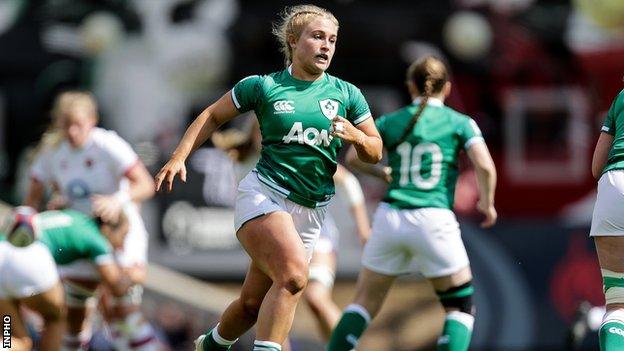Irish rugby: Eight women's players turn down Ireland contracts
- Published

Neve Jones said players faced a "really difficult decision" over professional contracts
Eight Ireland women's players turned down professional contracts, IRFU performance director David Nucifora has revealed.
It is understood that a stipulation of the new contracts, the first of their kind for Irish 15s players, is that they must play their rugby in Ireland.
Hooker Neve Jones, who plays in England for Gloucester-Hartpury, said players faced a "really difficult decision".
"We have had eight players turn down contacts," said Nucifora.
"Four of those are UK-based players and four based here. The four UK-based players are contracted to their [clubs] for the amounts of money I mentioned earlier [between £3,000-£10,000 per annum]."
"We have offered 37 contracts to date. We have had an uptake of 29 of those."
In August the IRFU said it would offer 43 professional women's contracts to 15s and sevens players that would "range up to 30,000 euro plus match fees and bonuses".
Nucifora, speaking at a briefing at the Aviva Stadium, said he understood why some players had turned down deals and the IRFU would "cater for them to keep playing the game at the highest level".
"One, they have a contractual obligation, but also they also made a decision that they would stay and play their rugby there this year," Nucifora added about the four UK-based players who rejected offers.
"The other four players are players that are not surprising to us; just the age bracket of players we have, we have produced a model that has come on in a very short period of time.
"Those other women have got jobs, they are committed to their careers which is understandable.
"We fully understand that you have financial obligations that don't permit you to be able take up those contracts. We could have just not offered contracts to the ones that we thought wouldn't take it up, but we have given people a choice, an option."
Nucifora, who also confirmed that John McKee will take up a full-time senior coaching role with the women's team, added the IRFU wanted to create a model that is flexible to players' needs.
"When you look at the facts behind it is no surprise to us that those earning significant amounts or have careers have a choice not to train full-time in a professional scenario," he added.
"They will be able to play for the clubs either in England or in Ireland and they will be able to train in a programme that suits their lifestyle at that point in time.
"That was always our intention to come up with a model that works like that."